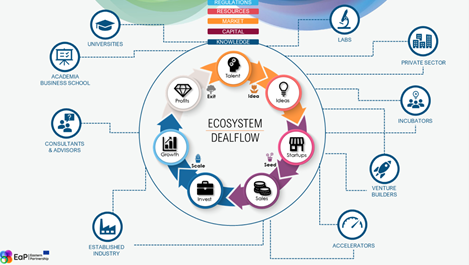Brussels, 28 October 2020
EaP Panel on SMEs, October 2020
EaP CSF representatives Natalia Harbuz (PPD-Network, Belarus), Konstantin Zghenti (Association of Business Consulting Organisations, Georgia), and Eka Gegeshidze (Junior Achievement Georgia) called on EU stakeholders to continue to support the digital transformation of SMEs in the EaP countries during the meeting of the EaP Panel on Structural Reforms, Financial sector architecture, Agriculture and SMEs.
The SME Panel discussions were built around the post-2020 EaP deliverables. In comments addressed directly to EU stakeholders, Natalia Harbuz (WG2 member) said the next generation of the EaP policy should establish a stable format for public-private dialogue in the EaP region, while Konstantin Zghenti (WG2 member) emphasised that EU support should go to a broader range of economic partners (not just state-owned initiatives and agencies). He also highlighted the importance of concentrating digitalisation efforts on the regions and rural areas.
Still within the framework of the deliverables discussion, European Commission representatives reiterated some of the broader economic priorities envisaged for the next phase of the EaP policy, such as the full implementation of the DCFTAs and trade agreements, mutual recognition of AEOs, and increased border crossing points and customs cooperation. Yet in addition to this, a number of potential SME-specific targets were also highlighted, including the provision of financial and/or technical support to 500,000 EaP SMEs per year, the leveraging of 1 billion EUR in local currencies in partnership with international financial institutions, and a 100 million EUR Seed Fund.
The panel focused also on several EU support initiatives and mechanisms aimed at enhancing the recovery of EaP SMEs in light of COVID-19 impact including EU4Business and EU4Digital. One of the highlights from the experts’ presentations was Mark Hellyer’s presentation of the EU4Business facility’s support to SMEs in the EaP region in recent years – including 188 million EUR in loans and 11 million EUR in grants. Jesus Lozano’s detailed explanation of the components necessary to foster a healthy start-up ecosystem in the EaP region, and of the initial proposals for a 100 million EUR EU-EaP Seed Fund to support this, was also of particular interest to participants.
Other contributions included Oxana Binzaru’s description of the power of international finance providers to make a positive impact within the community, namely by promoting a culture of entrepreneurship, sustainable development practices, and skills development, and a presentation by Anush Smonyan about the ways in which the EU can support the availability of equity in the EaP countries.
The third and final Panel under Platform 2, relating to the Harmonisation of Digital Markets (HDM), will take place on 13 November, with EaP members set once again to make an active contribution to discussions.


